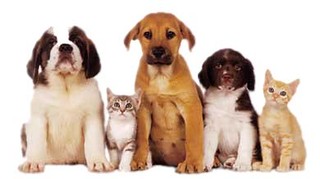| (Photo credit: vijairaj) |
2. When it comes to bath time, use an earth-friendly soap
3. Clean up with vinegar. Not only does it clean, but it also deodorizes. Use it to get up the hairballs in the carpet, drool on the couch, poo accidents or throw up... (Because let's face it, even the best trained pet has an accident once in a while.) It's better than bleach and still removes the mold and bacteria all the same. So instead of reaching for the bleach, try using vinegar to clean up pet messes.
4. Towel dry your pet after baths instead of using the blow dryer. While the blow dryer is fast and convenient, it's not good for the environment and it can dry out your animal's skin anyways, or frighten him. So dry him off well with a towel and then let him air dry the rest of the way.
Just make sure to keep him inside until he's really dry, especially if it's cold out. Not only do you not want your just bathed wet dog rolling around in the dirt, you also don't want him to get sick.
5. Use rags instead of paper towels for clean ups. You'll produce less waste by using rags for cleaning up any messes your pet makes. You'll also save yourself money by not having to buy paper towels all the time.
| Paws and More No Kill Animal Shelter in Washington, Iowa. (Photo credit: Wikipedia) |
7. Make your own fertilizer for your garden with your pet's waste. This makes for a great and natural fertilizer and you will use fewer bags throwing it away. (Note: Don't use pet feces on any area of the garden used for growing vegetables to eat, as disease can be spread this way. But it's fine to compost it with other items for flower beds, shrubs, trees, etc.)
8. For your cat, stop using clay kitty litters. Trade it in for an eco-friendly kitty litter
9. Don't give your pet bottled water. Use the faucet. If your water is not very good, add a filter to your faucet or get a separate filtration system - you'll be healthier too!
10. Instead of driving to the dog park, walk if you can. Or better yet, walk around the neighborhood with your dog. The exercise will be good for both of you! If you really want to get your dog out and socializing at the dog park and don't live in walking distance, then see if you can carpool with another one of your dog park buddies.
11. Use a natural flea repellent
Following these eco-friendly tips when it comes to pet care can be great for your wallet and they will make you feel good about what you're doing for the environment, too. It's also better for your pet, and it often will save you money. So try some of these tips, and go green with your pets today!



No comments:
Post a Comment